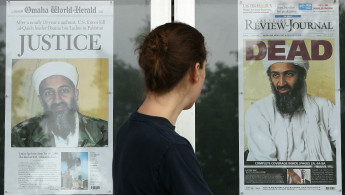How Bin Laden's mail exposed a massive CIA blunder
In light of the emergence of a yet more radical organisation, the Islamic State group (IS, formerly known as Isis), a cache of private messages exchanged between bin Laden and a number of al-Qaeda leaders can be interpreted differently today.
New threats
A batch of bin Laden's documents were revealed during trials of Pakistani nationals in New York who were suspected of being involved in the group.
These messages explain how al-Qaeda's founder perceived "the base of jihad", Iran, as the "security of the Gulf" and that US cash had indirectly reached the extremist group. Bin Laden also painted a picture of his vision for the organisation that eventually evolved into IS.
In one of the most important documents discovered at bin Laden's home in Abbottabad, northern Pakistan, was a 13-page report written by bin Laden on 22 October 2011.
In it, al-Qaeda's leader mentions talks being held between his group and the Afghani government to negotiate the release of an Afghani hostage. Bin Laden wrote that the negotiators should be cautiously dealt with because "money entails a lot of mistakes".
Bin Laden did not mention the source of these funds, however, the message addressed to Sheikh Mahmoud hinted that the money came from al-Qaeda's "enemies".
A security-obsessed bin Laden stated: "One should be cautious in general, even when receiving grants." This suggests that the funds were not "grants", and were most likely ransom money for the release of the Afghani hostage.
Bin Laden recommended that the al-Qaeda operatives who received the money should dispose of the bag carrying the notes to be sure it did not hide espionage or eavesdropping devices.
In these communications, bin Laden delved into the many details about the security measures required for the operation.
He also suggested that his aides rent a house in Peshawar and receive the ransom money there. Once the money was delivered, the leaser would leave the house and the money should be exchanged immediately afterwards.
"The brother" who receives the cash should take a cab and head to an indoor market and give the money to two more al-Qaeda operatives, which he suggested would be in US dollars or euros.
After the money is handed over to the al-Qaeda operatives, he should leave the scene immediately, and alone.
Bin Laden ordered that no meetings should be take place with the negotiators in Waziristan, or any region under surveillance by US drones, unless there is a "well-articulated plan" to avoid the enemy tracking them.
"You are well aware of the fact that the Americans could know that a certain party is negotiating with the mujahidin to release its hostage," he wrote.
"But the brother should not be a leader," he added in a separate line.
| God blessed us with a good amount of money this month. - al-Qaeda's Atiyah Abdel Rahman message to Osama bin Ladin |
Other communications suggested that bin Laden preferred the ransom money, which was sent to him for his personal expenses, to be in euros not US dollars.
This is how about $1 million, funded by the US taxpayers, and provided by the CIA to a secret Afghan government fund ended up in the hands of al-Qaeda, The New York Times reported on Saturday.
The newspaper revealed that the letters were discovered at bin Laden's home during the 2011 raid by US Navy SEALS that killed the al-Qaeda leader.
Enemy money
These communications were submitted as evidence in the trial of Abid Naseer, who was convicted this month in New York of supporting terrorism and plotting to bomb a shopping centre in Manchester, UK.
When bin Laden was killed, the US seized his personal laptop which contained communications with his top aides. Among these messages was one sent to Atiyah Abdel Rahman, one of bin Laden's closest associates and al-Qaeda's financial and administrative head.
"God blessed us with a good amount of money this month," he wrote in a letter to the leader in 2010.
"The Americans could be aware of this cash money delivered to al-Qaeda. The funds might have been coordinated with them so they would have the chance to track the movement of the money," bin Laden responded.
Many of these messages that were disclosed, and their original Arabic transcriptions, were available to al-Araby al-Jadeed to study. These documents were presented as evidence by prosecutors to a Brooklyn court in the trial of Naseer.
He was convicted earlier this month of plotting to blow up a UK shopping centre.
It was later revealed that bin Laden's concerns that the US money was a trap were baseless. According to The New York Times, at the time the ransom deal was struck, the CIA was delivering as much as $1 million in cash each month to Afghani officials.
Those payments continued throughout 2014, according to the newspaper and it was only until recently that the CIA was able to control how the money was used.
The aim of the secret funds was to buy the loyalty of Afghan warlords, legislators and other prominent - and potentially troublesome - figures. This helped the then Afghani leader Hamid Karzai to finance a vast patronage network that secured his power base.
The money was also used to cover expenses that needed to be kept "off the books", such as clandestine diplomatic trips, and for more mundane costs such as renting rooms at guesthouses where some senior officials lived.
The cash flow has slowed since a new president, Ashraf Ghani, assumed office in September, Afghan officials said, who refuses to elaborate.
However, they did reveal that cash was still coming in, and that it was not clear how robust the current US measures are to prevent another intelligence blunder in the future.
This article is an edited translation from our Arabic edition.



